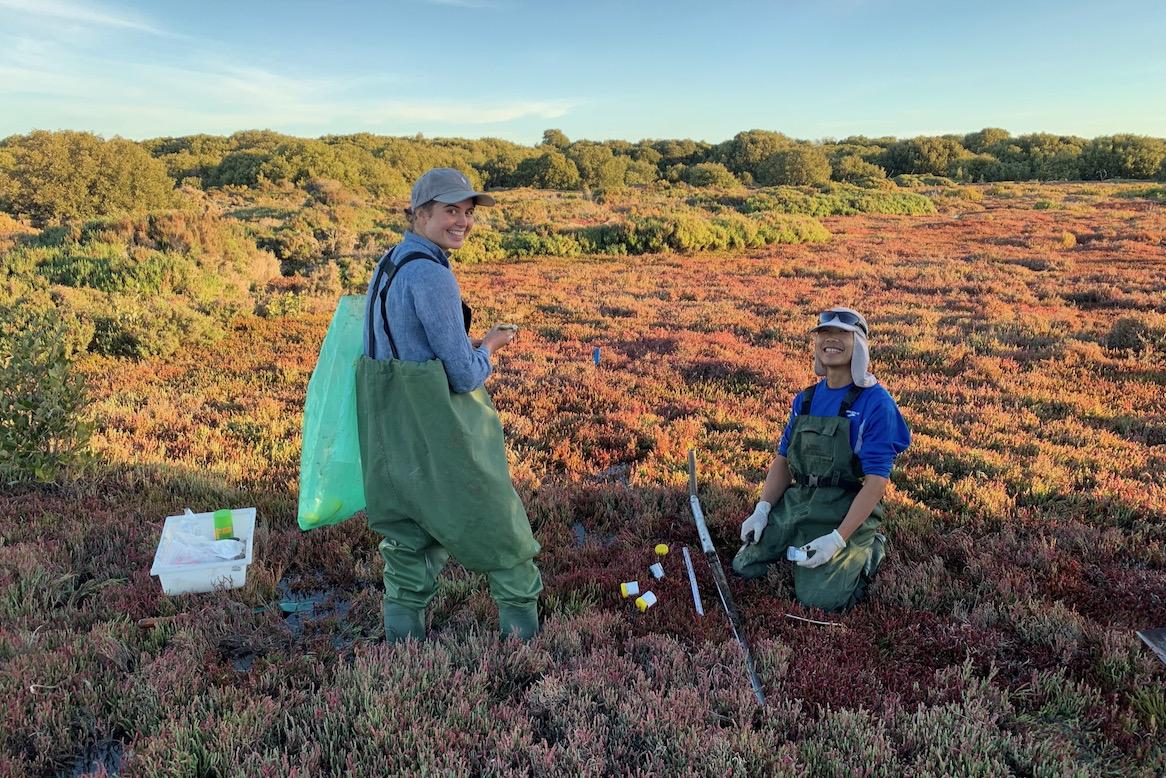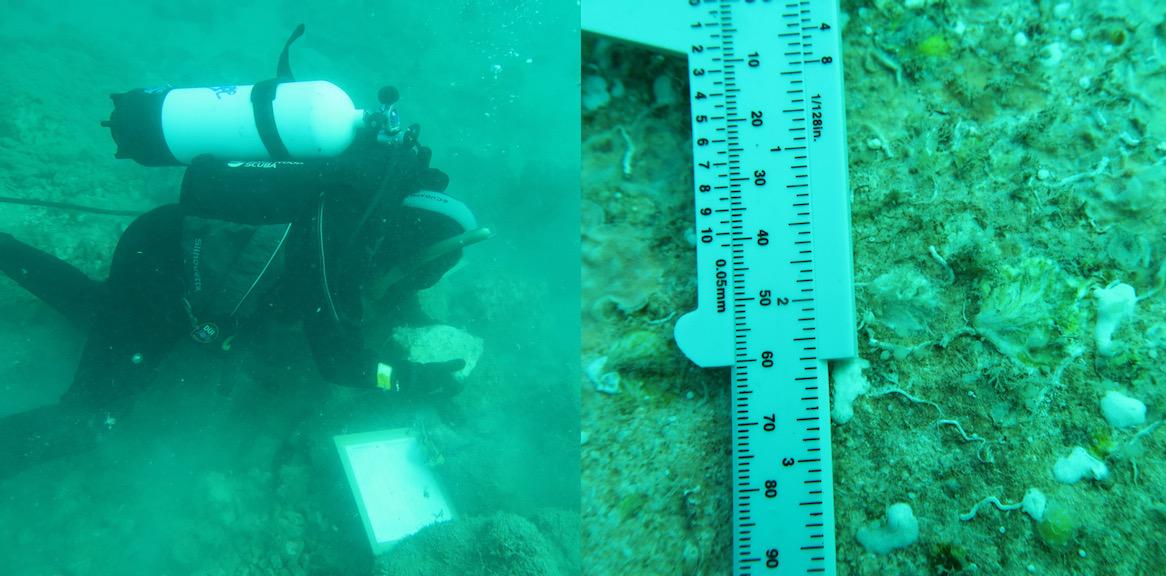Ecosystems restoration solutions

A project team supported by the Environment Institute at the University of Adelaide.
Ecological and social solutions delivering restoration of Australia’s coastal and marine ecosystems. South Australia provides national leadership in marine restoration, for which the long-term success requires evidence-based practices that maximise the ecological and social benefits of restoration.
Australia’s marine & coastal environment
Marine and coastal restoration efforts are rapidly accelerating across Australia. In South Australia, the successful restoration of lost seagrass communities, kelp forests, shellfish reefs, mangroves and saltmarshes will help secure the state’s socio-economic well-being and coastal ecosystem resilience. Restoration success in a fast-changing world requires the best scientific knowledge and fit-for-purpose approaches to ecosystem restoration.

Successful restoration of marine and coastal ecosystems provides recreational opportunities, public health benefits, increases fish production, improves coastal water quality, increases blue carbon storage and supports more resilient communities of marine species. Realising these benefits is complicated by a lack of knowledge on appropriate restoration practices that achieve the best ecological and social outcomes. Most marine restoration efforts are informed by past examples that utilise outdated practices informed by terrestrial restoration science. A step-change is required, where fit-for-purpose solutions drive marine and coastal restoration success.
South Australian marine ecosystem restoration requires solutions designed for the southern Australian context. This involves restoration practices that are innovative and cost-effective, adaptive to change, and that account for the multiple social, cultural, and economic users of the marine environment. Developing solutions for in situ practice, restoration management, and social and industry engagement, will ensure marine restoration programs provide long-term ecological and social benefits for a sustainable southern Australia.
Ecosystem Restoration Solutions
By harnessing the power of world-leading research to conserve and enhance the resilience of marine ecosystems, we can deliver new knowledge on the best restoration practices for ecological and social benefits. Such partnerships can help position South Australia as a global leader in ecosystem restoration.
Ecosystem Restoration Solutions is a team of multidisciplinary researchers at The University of Adelaide with broad experience in the ecological, socio-cultural, technological, and economic complexities of marine and coastal management.
-
Expertise in repairing southern Australia’s marine & coastal environments
Our researchers have wide-ranging expertise in the management and restoration of seagrass meadows, shellfish reefs, saltmarsh, mangrove and kelp forests, and coastal wetlands. We work with diverse government, industry, and community stakeholders on co-designing actionable solutions to:
- Provide a knowledge base to inform best practice for diverse marine and coastal restoration programs, including current pressures and future environmental change.
- Apply emerging technologies that assess and improve restoration outcomes and knowledge.
- Increase opportunities to derive multiple benefits from restoration projects (e.g. blue carbon benefits) by incorporating natural synergies (e.g. multi-habitat connectivity) into restoration planning.
- Generate opportunities for industry participation or co-design of restoration projects to boost ecological and economic outcomes.
- Identify the drivers of public acceptance of restoration projects and promote public participation.
- Visualise and communicate restoration opportunities and benefits through graphic, written, and conceptual models.

Partnering with Ecosystem Restoration Solutions
We recognise that for restoration to be a successful practice for managing marine and coastal systems, it must meet the expectations of diverse social, economic, and political stakeholders. Marine and coastal environments are complex systems, where nature and socio-economics are integrated.
They are ecologically dynamic and are increasingly impacted by climate change. By harnessing the power of world-leading research to conserve and enhance the resilience of marine ecosystems, we can deliver new knowledge on the best restoration practices for ecological and social benefits. Such partnerships can help position South Australia as a global leader in ecosystem restoration.
-
Ecosystem Restoration Solutions expertise
- Monitor marine and coastal habitat condition and water quality, site suitability analyses for restoration, and restoration monitoring.
- Identify and assess the social and economic benefits of restoring biodiverse habitats and their multiple ecosystem services (e.g. fisheries productivity, water quality, coastal protection and carbon sequestration).
- Design and implement multi-species and multi-habitat restoration practices with demonstrated ecological resilience, productivity and climate change mitigation benefits.
- Develop frameworks for the sustainable management of restored ecosystems.
- Forecast the adaptive capacity of natural and restored ecosystems to climate change.
- Provide solutions and identify industry partnerships to overcome ecological, economic, or social constraints to restoration, including accessing carbon and biodiversity crediting mechanisms to help fund coastal restoration projects.
- Engage and educate the public on restoration projects through citizen science programs and communication of engaging restoration content (e.g. video streams)
-
Case Study: Accelerating Restoration
To maximise the social, economic, and political benefits of marine restorations, our researchers have developed strategies to accelerate restoration outcomes. This has involved adapting emerging conservation technologies to our team’s understanding of the natural ecological processes that boost recovery. Such strategies have reduced the time required for restoration projects to achieve their goals.
Solutions for Ecosystem Restoration has been integral to the early success of South Australia’s restored shellfish reefs. Our researchers have moved past traditional monocultures to develop a new multi-species approach to restoration which offers resilience and permanence.
Other techniques have involved playing natural marine sounds to attract baby oysters to restoration sites where they would otherwise be lost at sea. These strategies reduce the time, cost, and risk of restoration projects whist working towards outcomes that contribute to society’s well-being.

Ecosystems restoration solutions - our list of experts
-
Marine and coastal monitoring
Area of expertise
- Novel remote sensing techniques for coastal ecosystem condition monitoring & drone-based monitoring of coastal wetlands and seagrasses (for assessing and predicting the success of conservation, restoration and water quality management actions).
- Documenting environmental change from “pre-impact” data; including historical records, sediment records, marine fauna and flora surveys, aerial imagery, carbonate proxies and isotopes.
- Cumulative impact assessment, ecosystem resilience and benefit of coastal management
Researchers
Professor Sean Connell
Professor Bronwyn Gillanders
Dr Alice Jones
Dr Dominic McAfee
Dr Camille Mellin
Professor Ivan Nagelkerken
Dr Patrick Reis Santos
Dr Ramesh Raja Segaran
Associate Professor John Tibby
Dr Jonathan Tyler
Professor Michelle Waycott -
Restoration and blue carbon
Area of expertise
- Seascape and multi-species design to optimise outcomes
- Boosting restoration success cost effectively
- Mangroves, seagrasses, oyster reefs
- Coastal carbon and biodiversity crediting mechanisms and markets
Researchers
Professor Sean Connell
Professor Bronwyn Gillanders
Dr Alice Jones
Dr Dominic Mcafee
Professor Ivan Nagelkerken
Professor Michelle Waycott

Contact us
Would you like to discuss working with the Ecosystems restoration solutions team?
Contact: Professor Sean Connell
Theme Lead – Marine and Freshwater Ecosystems
School of Biological Sciences
The University of Adelaide SA 5005 Australia
E: sean.connell@adelaide.edu.au
T: +61 8 8313 5513
